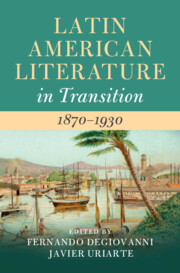Book contents
- Latin American Literature in Transition 1870–1930
- Latin American Literature in Transition
- Latin American Literature in Transition 1870–1930
- Copyright page
- Contents
- Figures
- Contributors
- Acknowledgments
- Introduction
- Part I Commodities
- Part II Networks
- Chapter 7 Latin Americanisms
- Chapter 8 Cosmopolitanisms
- Chapter 9 Chinoiseries
- Chapter 10 Diasporas
- Chapter 11 Feminisms
- Part III Uprisings
- Part IV Connectors
- Part V Cities
- Index
- References
Chapter 7 - Latin Americanisms
from Part II - Networks
Published online by Cambridge University Press: 14 January 2023
- Latin American Literature in Transition 1870–1930
- Latin American Literature in Transition
- Latin American Literature in Transition 1870–1930
- Copyright page
- Contents
- Figures
- Contributors
- Acknowledgments
- Introduction
- Part I Commodities
- Part II Networks
- Chapter 7 Latin Americanisms
- Chapter 8 Cosmopolitanisms
- Chapter 9 Chinoiseries
- Chapter 10 Diasporas
- Chapter 11 Feminisms
- Part III Uprisings
- Part IV Connectors
- Part V Cities
- Index
- References
Summary
Latin Americanism was a topic of intense intellectual scrutiny and political and social activism at the turn of the twentieth century. The rise of the United States as a global power triggered a wide range of debates on the idea present and future of Latin America as an integrated historical and cultural entity. By exploring the work of José Martí and José E. Rodó, who imagined Latin Americanism within the limits of the pedagogical sphere, as well as contributions of Manuel Ugarte and the leaders of the Alianza Popular Revolucionaria Americana (APRA), who attempted to transform it into a militant movement connected to politics on the streets, this chapter shows both the possibilities and limitations of a university-based reformist project in constant search of expanding its social bases and institutional support. Issues of gender bias, language dominance, and ethnic hierarchies are at the center of this discussion about the challenges that Latin Americanism has faced over time.
Keywords
- Type
- Chapter
- Information
- Latin American Literature in Transition 1870–1930 , pp. 105 - 120Publisher: Cambridge University PressPrint publication year: 2022

